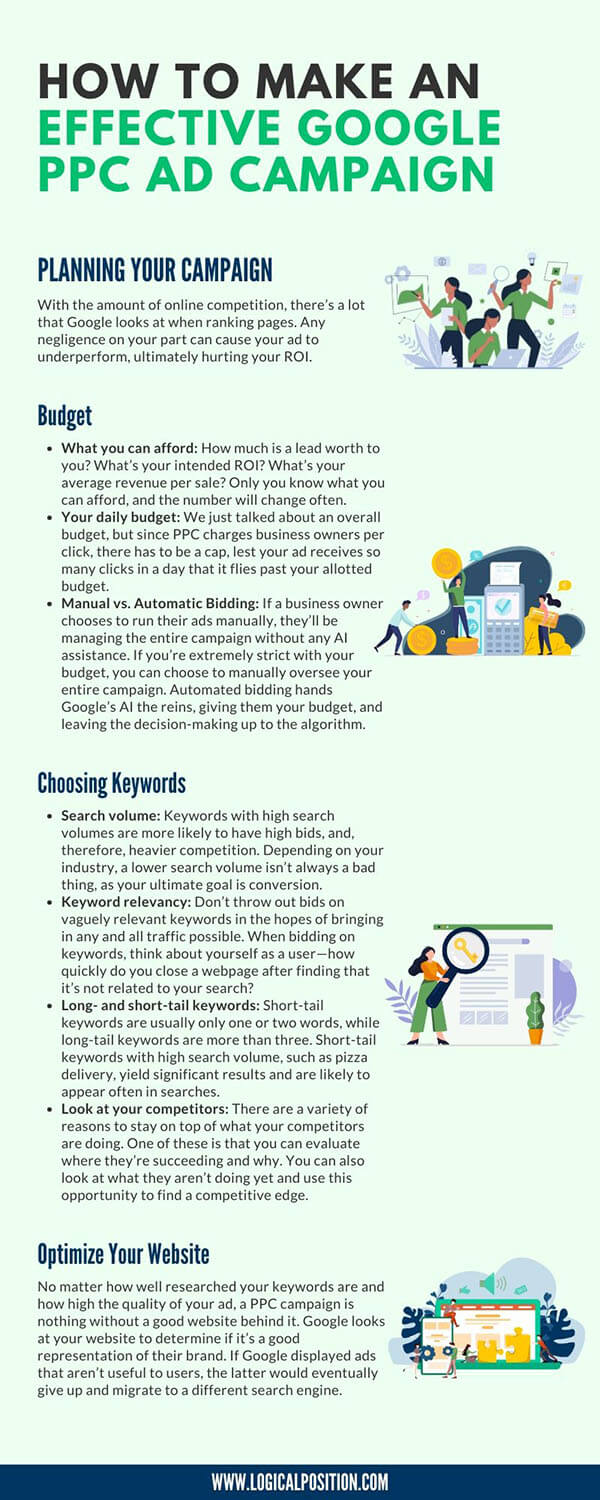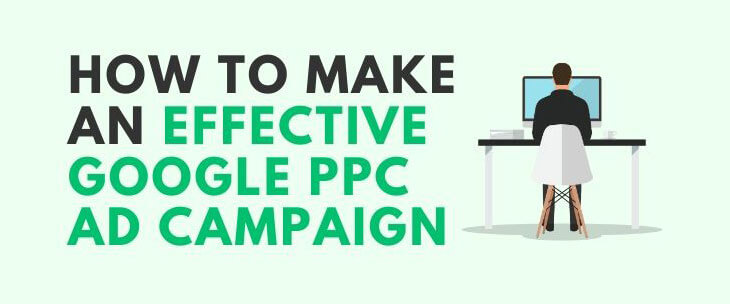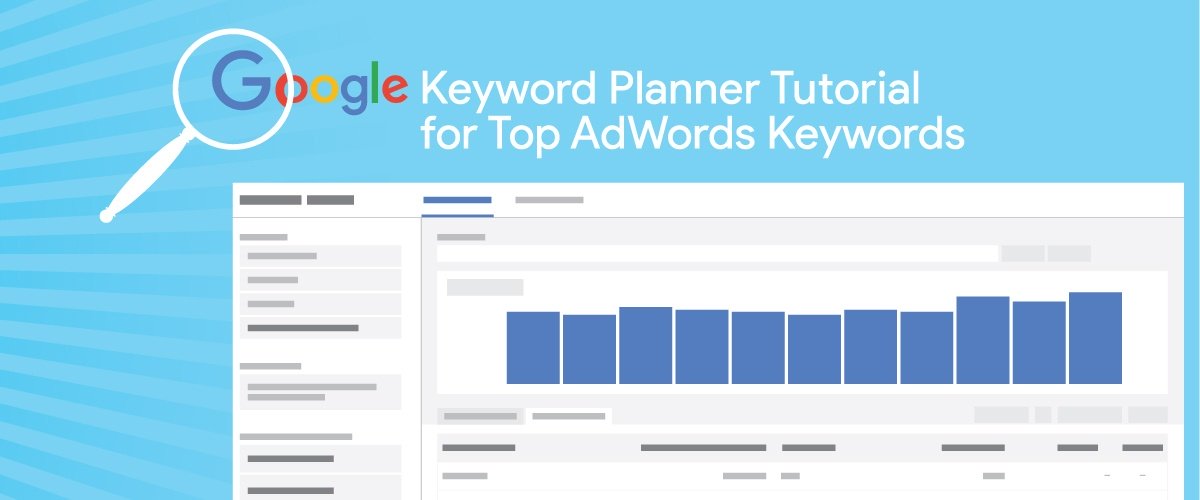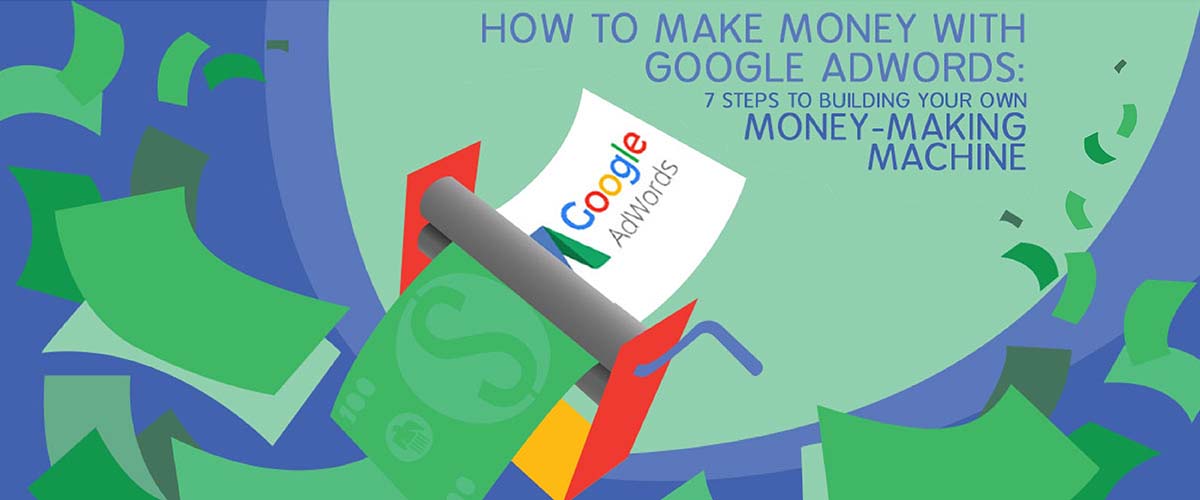Pay-per-click—commonly acronymized as PPC—is a popular online advertising model in which ads display on search engines such as Google via a bidding system. PPC operates by business owners paying a small fee each time someone clicks on their ad with the intent of earning more by website visits than they’re paying for their ad. This form of advertising functions using a bidding system in which each keyword has a different value, depending on its worth. For example, a high-volume search term, such as soccer cleats, may cost far more to earn the top spot in the SERPs than a term that fewer people search for, such as local bait shop.
For your PPC campaign to succeed and turn a profit, you need to fully understand how a PPC campaign works to meet today’s accepted standard. If you’re new to the world of PPC, or you’re hoping to see more bang for your buck, keep reading our guide on how to create a successful PPC campaign.
What PPC Can Provide Businesses
Anyone who runs a business isn’t going to invest in a marketing technique they don’t believe will ultimately turn a profit. While creating a marketing campaign doesn’t automatically guarantee success, there’s a reason that millions of businesses use them. The ultimate goal with PPC is to drive traffic to your site and, ideally, to turn this traffic into conversions. What can PPC provide businesses? The answer we’re sure you want to hear, and that’s true under the right circumstances, is profit.
Should Small Businesses Run PPC Campaigns?
Many search terms yield results for big-box companies that may seem impossible to compete with at face value, which can deter many small business owners from even trying. As a business owner yourself, you need to put that nagging worry aside and, instead, look at how you can use your niche to gain visibility with those in the market for your specific product. The following are a few reasons a small business owner should consider PPC:
- Local or long-tail keywords can help you reach your target audience
- PPC ads grow brand visibility
- You’ll have the ability to monitor measurable results
- Your competitors are doing it
Planning Your Campaign
Building an effective PPC campaign is an incredibly involved process, and you don’t want to overlook any aspect of the creation. With the amount of online competition, there’s a lot that Google looks at when ranking pages. Any negligence on your part can cause your ad to underperform, ultimately hurting your ROI. In this section, we outline how to prepare your PPC ad to go live.
Budget
There are too many facets behind a marketing budget to create a hard and fast rule for developing one. Your budget is, naturally, going to depend on the needs and abilities of your business. That said, there are a few standard boxes you should check when creating your budget.
- What you can afford: Being proactive in a marketing campaign can be extremely valuable in building long-term results, but it’s also important to not overspend. How much is a lead worth to you? What’s your intended ROI? What’s your average revenue per sale? It takes constant analysis to gauge the success of your PPC campaign, only for the answers to fluctuate. Only you know what you can afford, and the number will change often.
- Your daily budget: We just talked about an overall budget, but since PPC charges business owners per click, there has to be a cap, lest your ad receives so many clicks in a day that it flies past your allotted budget. As such, you can parcel out how much of your budget Google can use per day. Know that a business doesn’t need to run an ad 24 hours, 7 days a week. You can choose what days and times you’d like Google to show your ads while excluding others.
- Manual vs. Automatic Bidding: Google offers business owners options regarding how much time they spend managing their ad campaign. If a business owner chooses to run their ads manually, they’ll be managing the entire campaign without any AI assistance. If you’re extremely strict with your budget, you can choose to manually oversee your entire campaign. Automated bidding hands Google’s AI the reins, giving them your budget, and leaving the decision-making up to the algorithm. While this can save you a lot of time, some prefer the control afforded by manual bidding.
Choosing Keywords
A PPC campaign is all in the keywords. These are what you’ll be bidding on and what will lead users to your site. As such, an effective campaign requires that you choose the appropriate keywords. Take note of the following before bidding on keywords:
- Search volume: How often users search for a keyword in a day is a major player when determining bid value. Keywords with high search volumes are more likely to have high bids, and, therefore, heavier competition. Depending on your industry, a lower search volume isn’t always a bad thing, as your ultimate goal is conversion. Those searching for a service provided by niche businesses are often doing so with a strong intention of making a transaction.
- Keyword relevancy: It’s imperative to keep your focus on the keywords most relevant to your business. Don’t throw out bids on vaguely relevant keywords in the hopes of bringing in any and all traffic possible. When bidding on keywords, think about yourself as a user—how quickly do you close a webpage after finding that it’s not related to your search? When other users are doing this same thing with your ads, you’re the one losing money.
- Long- and short-tail keywords: You may bid on a mixture of long- and short-tail keywords. Short-tail keywords are usually only one or two words, while long-tail keywords are more than three. Short-tail keywords with high search volume, such as pizza delivery, yield significant results and are likely to appear often in searches. Vegan pizza delivery in Ann Arbor may be a lengthy and less common search term, but it may yield a lower bid amount and higher conversion rate.
- Look at your competitors: There are a variety of reasons to stay on top of what your competitors are doing. One of these is that you can evaluate where they’re succeeding and why. You can also look at what they aren’t doing yet and use this opportunity to find a competitive edge.
- There is some trial and error: Even though there are multiple tools people can use to research and create a well-informed PPC campaign, there is still a need for trial and error. Not everything will always work, so you have to be able to ride the waves.
Optimize Your Website
No matter how well researched your keywords are and how high the quality of your ad, a PPC campaign is nothing without a good website behind it. Google looks at your website to determine if it’s a good representation of their brand. If Google displayed ads that aren’t useful to users, the latter would eventually give up and migrate to a different search engine. Additionally, you’re only going to create conversions if visitors to your site deem it worth their time.
Create a website that’s easy to navigate and user-friendly. Your ad’s landing page should be relevant to the ad itself and not confuse users. Remember—your ad is only as good as the product you’re offering.

Maintaining Your Campaign
The marketing process doesn’t end once you set up your ad and make it live. The next step to creating your ad is maintaining it. The following are a few ways to stay on top of a successful PPC campaign:
- Consistently analyzing results, including:
- Click-through rates
- Conversion rates
- Your ad’s quality score
- Ad position in the SERPs
- Number of impressions
- Experimenting and trying new things
- Keeping your ad copy fresh and up to date
- Making adjustments as needed
Getting the Most Out of Your Campaign
PPC is a competitive playing field, and it takes a lot of time and knowledge to run an effective campaign. The digital world changes constantly, and small changes can make big differences. It’s for this reason that our professionals at Logical Position work to stay on top of digital trends and use our knowledge to further the success of our thousands of clients.
If you are looking to consult with a PPC marketing agency to help you run the best campaign you can for your business, we encourage you to get in touch with us today for a free consultation. We look forward to being a part of your marketing journey.




